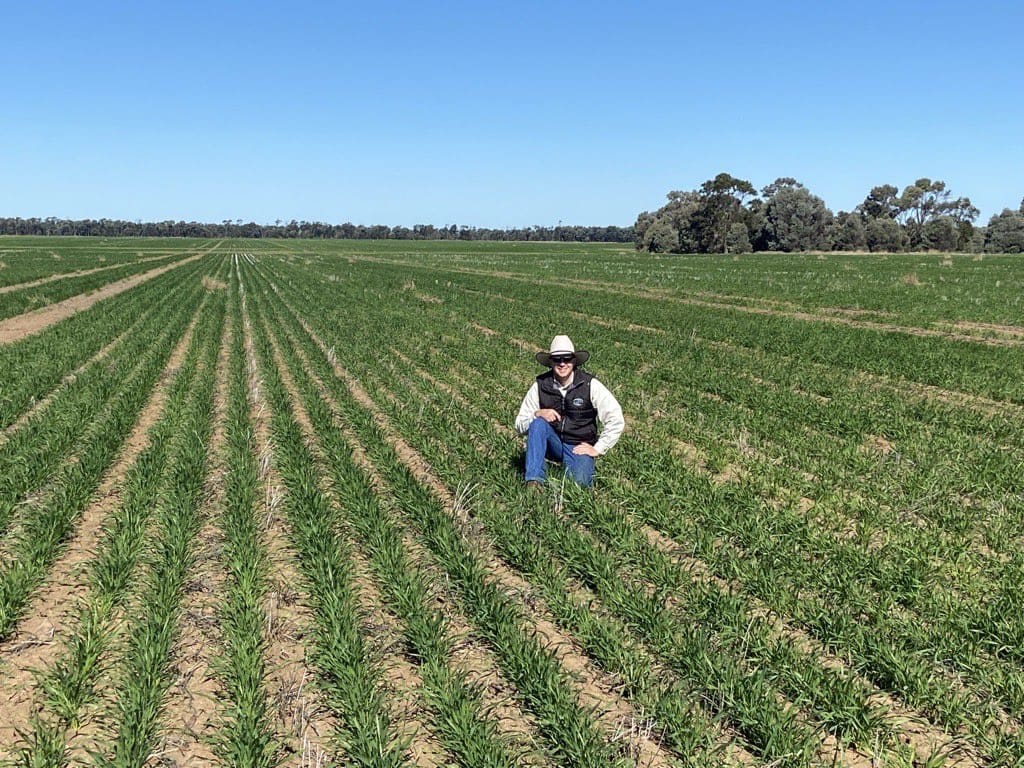
Crop conditions vary hugely in Queensland and northern NSW, with many early planted crops like this ValiantCLPlus wheat near Condamine thriving, but other paddocks either too wet to plant or harbouring waterlogged crops. Photo: Matt Nauman, Intergrain
PRICES moves in eastern Australia’s feedgrain market have been mixed and modest in the past week as traders weigh up the impact of rain in New South Wales, and grower interest in selling grain from July onwards increases.
Traders are reporting a drop-off in export demand for SFW-type wheat, which has consumers more comfortable about securing supplies and also booking trucks to carry it from bulk and on-farm storages.
While barley appears to be in short supply, prospects of an average or better season across southern Australia, and a late swing into barley in the north because of the excessively wet conditions, have consumers feeling confident that tonnes will be flowing to market in coming months.
| Today | Jun 2 | |
| Barley Downs | $475 | $480 |
| SFW wheat Downs | $505 | $495 |
| Sorghum Downs | $400 | $398 |
| Barley Melbourne | $462 | $455 |
| ASW wheat Melbourne | $480 | $475 |
| SFW wheat Melbourne | $475 | $468 |
Table 1: Indicative delivered prices in Australian dollars per tonne.
More patchy rain in north
The past week has brought more rain to some cropping districts in Queensland and New South Wales, but a blessedly dry week for others, and some farms are now advancing planting from the 20-50-per-cent mark.
In the week to 9am today, registrations in Central Queensland include: Capella 5mm; Emerald 21mm and Springsure 13mm; in southern Queensland, totals include: Dalby 17mm; Felton 24mm; Macalister 15mm, and Roma 12mm.
In northern NSW, higher registrations include: Coonamble 16mm; Gunnedah 15mm; Moree 20mm; Narrabri 17mm, and Walgett 17mm.
While growers are still keen to plant wheat, the rain-enforced delay of 2-3 weeks has pushed them towards shorter-season varieties, and seed is hard to get.
“In northern NSW and it Queensland, a lot of growers will carry that moisture over to plant sorghum, mungbeans and dryland cotton in the spring.”
If conditions dry off sufficiently to allow planting in the last half of June, growers are expected to plant a larger-than-intended area of barley and durum, while wheat area is likely to contract.
Regardless of what crop is planted, the north has plenty of grain coming, and growers are said to be keen to quit some stocks post July 1 to make room for it on farm.
“We’re starting to see more grower interest in the July forward market,” one trader said.
“Things are certainly softer, and there’s more happening on the offer side.”
Shorts to fill export vessels and containers in NSW are Queensland are now seen as covered, and road freight has become easier to book as a result.
The new-crop market for wheat is shaping up at a $25/t inverse to current crop plus carry, and some growers have already locked in a small percentage of their 2022-23 crop on a multigrade contract.
Trade sources report faba beans are making their way into poultry and ruminant rations at around $450/t delivered mill now that bulk pathways out of Brisbane
South sitting pretty
In southern growing areas, most growers have finished planting, or are very close to it.
While pockets of southern NSW are excessively wet, most of the region’s crops are off to a strong and early start.
In the past week, registrations in southern NSW include: Cootamundra 26mm; Temora 15mm; West Wyalong 9mm, and Young 16mm.
South Australia and Victoria had handy rain of 5-30mm in most major growing areas, all ideal for recently germinated crops.
Peter’s Commodities trader Peter Gerhardy said the market appears to have stabilised.
“Some shorts will stick their head up, but it does seem to have flattened out,” Mr Gerhardy said from his base in the eastern Riverina.
“Crops are 90pc in, and that 10pc left to is very very wet in some place.
“Victoria’s a different kettle of fish; they’re traveling along nicely.”
“I think the consumer is comfortable.”
Corn at around $460/t delivered Melbourne is being bought by some stockfeed millers, and faba beans are at maximum inclusion rates in many rations because of their attractive pricing compared with cereals.
Grain Central: Get our free news straight to your inbox – Click here

HAVE YOUR SAY